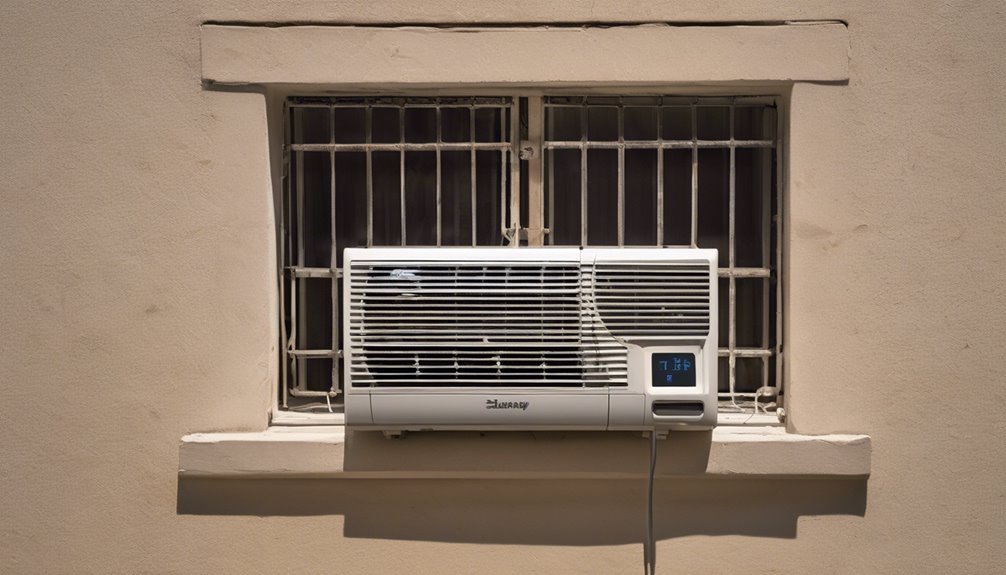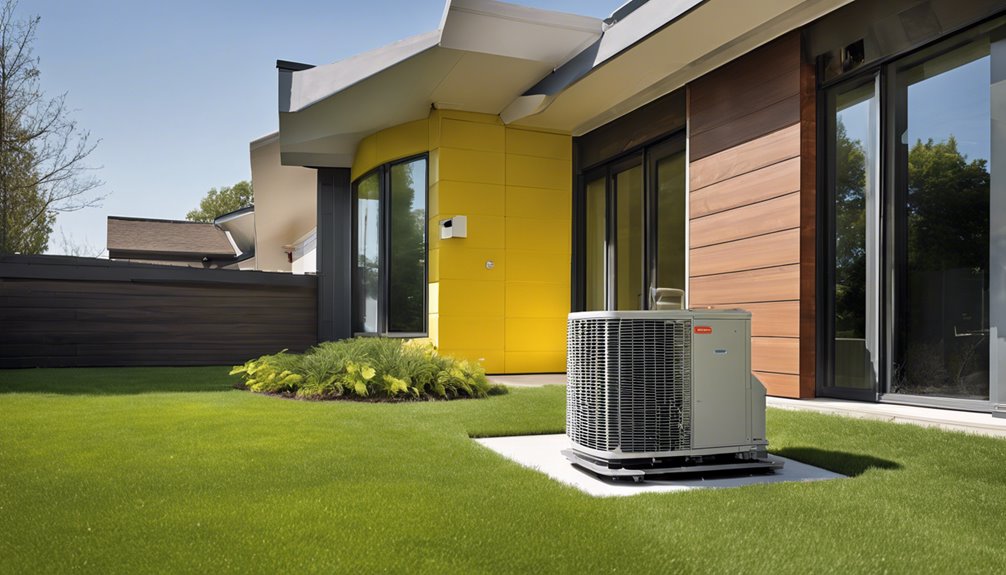You're not alone if your window AC is making a loud buzzing noise – it's a common issue with a few possible causes. Vibration or air leaks, improper installation, loose or faulty parts, airflow issues, electrical or motor problems, and maintenance oversights can all contribute to the racket. To silence the buzz, you'll need to identify the root cause, whether it's a dirty air filter, worn bearings, or something else. By understanding the source of the noise, you'll be on your way to a quieter, more peaceful space – and we'll help you get there.
Key Takeaways
- Vibration or air leaks from improper installation or insulation gaps can cause a loud buzzing noise in window AC units.
- Loose or faulty parts, such as worn bearings or loose screws, can produce a buzzing sound when the AC is running.
- Dirty air filters, ventilation obstructions, or airflow issues can make the AC work harder, resulting in a loud buzzing noise.
- Electrical or motor problems, including worn bearings, capacitor issues, or loose connections, can cause a loud buzzing or grinding noise.
- Neglecting routine maintenance and cleaning tasks, such as cleaning coils and replacing air filters, can lead to a loud buzzing noise.
Identifying the Source of the Buzz
What's causing that annoying buzzing noise coming from your window AC?
It's likely due to vibration or air leaks. Check if the unit is properly installed and seated in the window. If it's not, it can cause vibration that leads to the buzzing noise.
You can try adjusting the unit or adding vibration damping materials like rubber pads to reduce the noise.
Another possible culprit is insulation gaps around the window or AC unit. These gaps can allow cold air to escape and warm air to enter, causing the compressor to work harder and produce more noise.
Seal any gaps with insulation or weatherstripping to see if that solves the problem.
Loose or Faulty Parts
If you've ruled out installation and insulation issues, it's time to look inward – literally.
Now, it's time to inspect the internal components of your window AC.
Loose or faulty parts can be the culprits behind the loud buzzing noise.
- Worn bearings: Over time, bearings can wear out, causing friction and vibration that leads to buzzing.
- Loose screws: If screws are loose, they can rattle and create a buzzing noise when the AC is running.
- Faulty fan motor: A malfunctioning fan motor can produce a loud buzzing sound.
Airflow Issues and Blockages
Airflow issues and blockages can also be a significant contributor to the loud buzzing noise emanating from your window AC.
You mightn't realize it, but a dirty air filter can cause your AC to work harder, resulting in a loud buzzing noise. Make sure to clean or replace the air filter regularly to ensure proper airflow.
Additionally, check for any ventilation obstructions, such as curtains or furniture, that might be blocking the airflow. If you find any blockages, move them away from the AC to improve ventilation.
Electrical or Motor Problems
Electrical or motor problems within your window AC can be another culprit behind the loud buzzing noise.
Electrical or motor issues within your window AC unit can also be the source of the annoying loud buzzing noise.
These issues can be tricky to diagnose, but there are some common culprits to look out for.
- Worn bearings: Over time, the bearings in your window AC's motor can wear out, causing a loud buzzing or grinding noise.
- Capacitor issues: A faulty capacitor can prevent the motor from running efficiently, resulting in a buzzing or humming sound.
- Loose or corroded connections: Make sure to check the electrical connections within your window AC for any signs of wear or corrosion, as these can also cause a loud buzzing noise.
Maintenance and Cleaning Oversights
Your window AC's loud buzzing noise could be a result of neglecting routine maintenance and cleaning tasks.
You might've forgotten to clean or replace the air filters, which can cause the AC to work harder and produce a buzzing sound. Dirty filters can also reduce airflow, making the AC's compressor work overtime, leading to a loud buzzing noise.
Additionally, neglected coils can cause the AC to vibrate excessively, resulting in a loud buzzing sound.
Make sure to clean the coils and filters regularly to prevent these issues. A simple cleaning routine can go a long way in reducing the noise and improving your window AC's overall performance.
Frequently Asked Questions
Can I Use a Window AC in a Room With No Windows?
You can't install a window AC in a room with no windows, but you can consider alternative ventilation options. Look into interior installation methods, like a ventless AC or a portable AC, that don't require a window for operation.
Will a Buzzing Window AC Increase My Electricity Bill?
You're wondering if a noisy window AC will hike up your electricity bill. Yes, it likely will, as increased energy consumption often correlates with higher noise levels, so a buzzing unit might be working harder and consuming more power.
Can I Fix a Buzzing Window AC Myself?
You can try DIY troubleshooting before calling a pro, but be cautious. For simple issues, you might be able to fix it yourself with some AC maintenance, like cleaning the filter or coils, but more complex problems may require expert help.
Is a Buzzing Window AC a Fire Hazard?
You're right to worry about a buzzing appliance being a fire risk. If it's due to an electrical surge, you're at risk of a fire starting. In this case, it's crucial to unplug the AC and have it checked by a pro to ensure your safety.
Can I Replace a Buzzing Window AC With a New One?
You can replace an old model with a new one, but first, check if the warranty coverage is still valid, and if so, you might be able to get a free replacement or a discount on a new unit.
Conclusion
You've troubleshooted the source of the loud buzzing noise from your window AC. Now, it's time to take action. If it's a loose or faulty part, tighten or replace it. Clear any airflow blockages, and ensure proper electrical connections. Regular maintenance and cleaning can also resolve the issue. By addressing the root cause, you can enjoy a quieter and more efficient cooling experience. Don't let the buzzing noise drive you crazy – fix it and relax!



